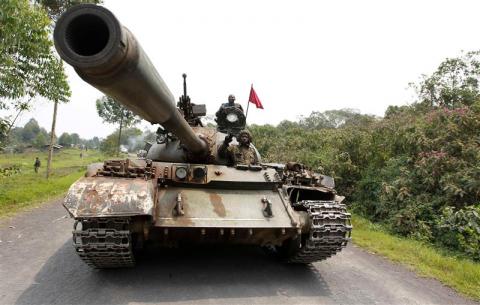Advertisement
Congo Army Fights On Despite Rebel Ceasefire Offe
GOMA, Democratic Republic of Congo (Reuters) - F ighting erupted on Saturday between eastern Congolese rebels and the army, which said it would push on with an offensive to recapture all territory controlled by insurgents despite their call for a ceasefire.
Democratic Republic of Congo's army, backed by a new U.N. brigade with an unprecedented mandate to launch attacks, has forced M23 rebels to retreat from positions they have held for months overlooking the eastern city of Goma.
Some shells fired during recent fighting have landed in neighbouring Rwanda, threatening to pull the small but militarily powerful country openly into the conflict.
Both Congo's army and rebels have accused the other of firing the missiles. U.N. experts and Congo's government says Rwanda is already backing the rebels but Kigali denies this.
Both sides said fighting erupted several kilometres (miles) north of Kibati, hilltop positions seized from rebels on Friday - the latest in nearly two decades of unrest fuelled by ethnicity, local politics and competition over land and mineral wealth.
" are criminals and we are obliged to pursue them. We want to recapture all of the territory they currently occupy and restore the authority of the army and state," said Congolese army spokesman Lt Colonel Olivier Hamuli.
In a statement sent to journalists, M23 confirmed the resumption of fighting and complained it came despite a pullback by its troops and an offer of a ceasefire.
RWANDAN ARMOUR
U.N. forces in North Kivu province, where the fighting is taking place, said they were not involved in the latest clashes.
The army's U.N.-backed advance this week is the most significant victory government troops have recorded during this latest 18-month rebellion, whose leaders complain the Kinshasa government failed to honour the terms of a deal to end an earlier, similar uprising.
M23 seized Goma last November after insurgents overran the army and marched past U.N. peacekeepers. The rebels withdrew under intense international pressure and started peace talks with the government but these have stalled.
The failure of U.N. peacekeepers to protect Goma led to the creation of an "Intervention Brigade" with a robust mandate to neutralise rebels. This force was spurred into action last week by the shelling of Goma and nearby Gisenyi, in Rwanda, that killed several civilians.
The United Nations has blamed the rebels for the shelling but M23 and Rwanda have said Congo's army was responsible. Kigali has accused Kinshasa of provocation and has not ruled out dispatching troops to Congo to protect its territory.
Rwandan media published photos of armour being sent towards Rwanda's northern border with Congo this week. Congo's government and U.N. peacekeepers have said there are already signs of Rwandan infiltration.
Diplomats say world leaders are applying pressure on Rwanda's President Paul Kagame not to intervene.
Rwanda and Congo have fought two wars in the last two decades, with Kigali arguing it had to send troops to Congo to hunt down extremist Hutu rebels who fled to Congo after the 1994 genocide in Rwanda.



















Add new comment